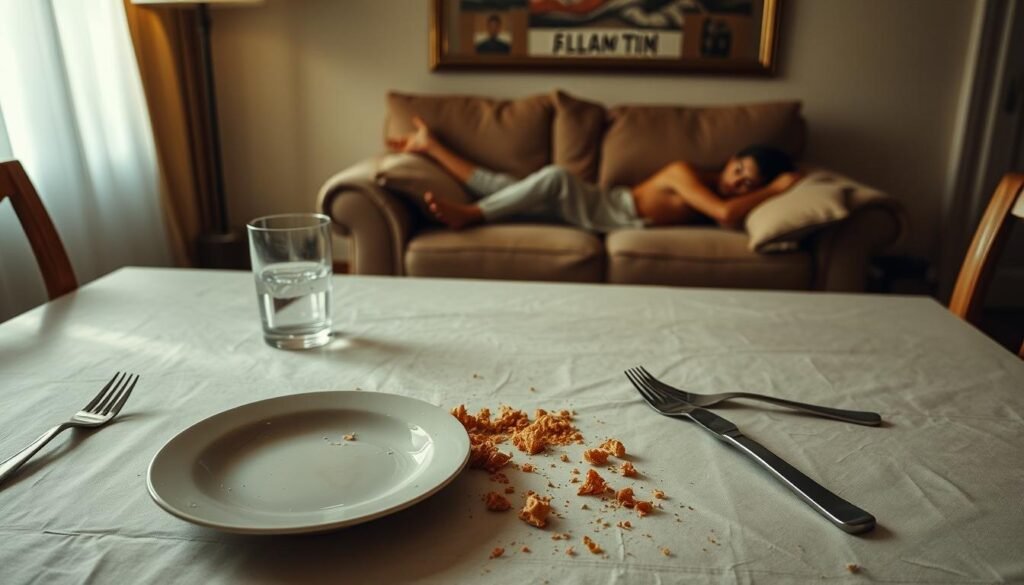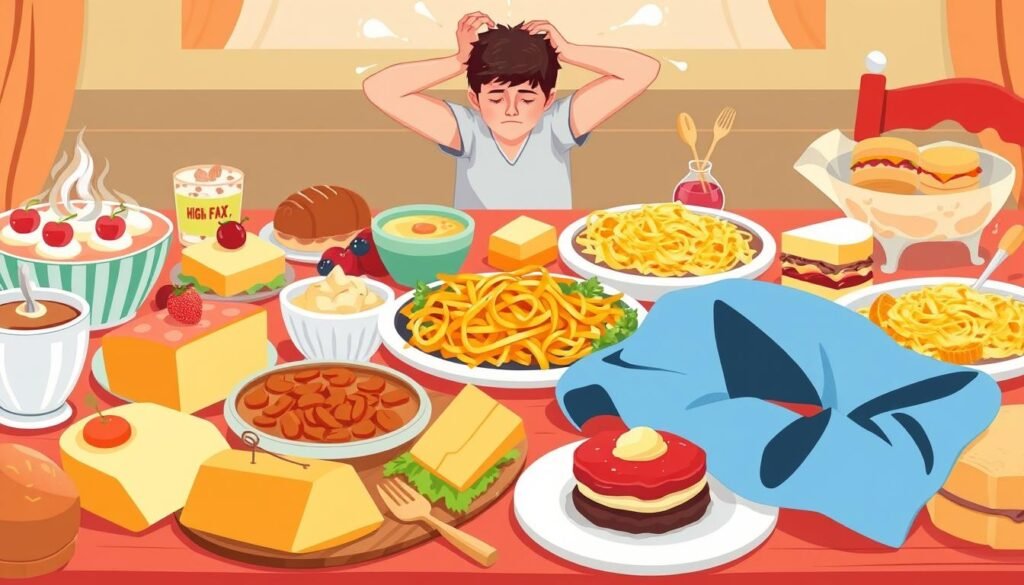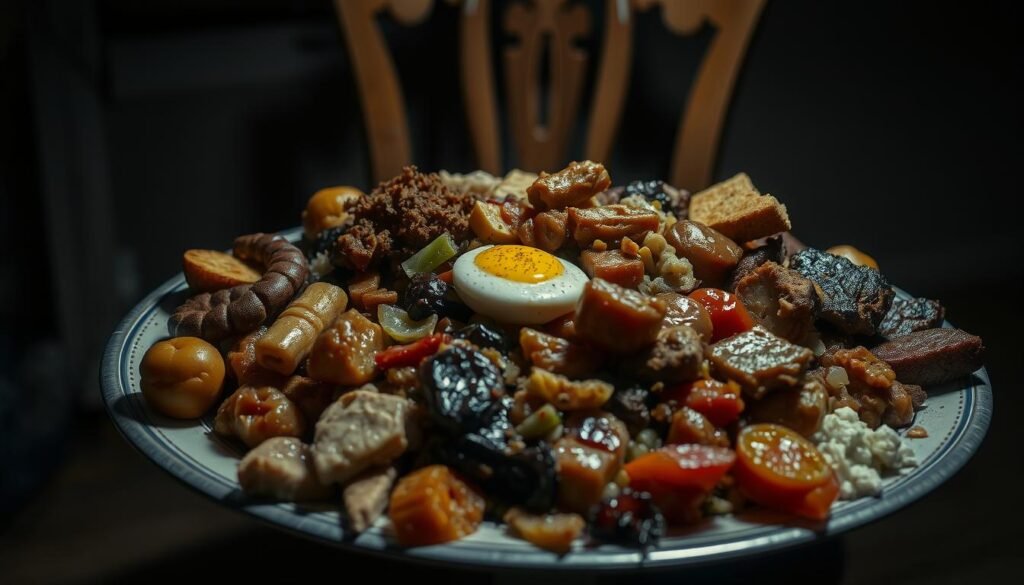Did you know that over 5.6% of Americans have anemia? This condition can make you feel really tired after eating. It’s not just about eating too much. The tiredness can come from what you eat, how much, and when you eat it. A study in 2023 found that certain foods can make you sleepy, especially those with tryptophan. This is because it helps produce serotonin.
Feeling tired after eating once in a while is okay. But if it happens a lot, you should check your diet and lifestyle. Knowing what your body needs is key. You can find great advice and tips here. Figuring out why you get tired after meals can help you feel more energetic.
Key Takeaways
- It’s normal to feel sleepy after eating and it doesn’t always mean something is wrong.
- What you eat can really affect how tired you feel afterwards.
- Foods high in carbs or fat can make you feel more tired.
- The size of your meal and when you eat it can impact your alertness.
- If you’re often tired, it’s a good idea to talk to a doctor.
Understanding Postprandial Somnolence
Postprandial somnolence is when we feel tired after eating. It’s also known as meal-induced exhaustion, especially common in the afternoon. Our body’s clock makes us feel this “post-lunch dip.”
Hormonal changes and digestion efforts cause this tiredness. A 2021 study showed that truck drivers eating more vegetables and staple foods felt less tired than those eating meat and fish. It suggests certain foods can prevent a post-meal energy crash.
Fruit flies also helped scientists understand this. Big meals with a lot of protein and salt made them sleepy. In 2019, Brazilian truck drivers who ate smaller, balanced meals didn’t feel as tired after eating.
Skipping meals can also affect how awake we feel. Missing breakfast led to reduced brain blood flow after lunch in a 2018 study, making sleepiness worse. There’s no specific cure for postprandial somnolence. But, we can do things like light activities after eating, eat smaller amounts, and keep our diet balanced to help fight off tiredness.
Common Causes of Extreme Fatigue After Eating
Digestive fatigue is widespread. It’s sparked by various nuances. After eating, our bodies undergo changes, leading to tiredness. For example, as the body digests food, it focuses less on keeping us alert. Blood flows more towards our gut. This shift can lower our energy significantly.
What we eat has a big impact on this fatigue. Meals heavy in fats, carbs, or proteins throw off our usual rhythm. This can lead to feeling sleepy during the day. Foods with melatonin or tryptophan, plus simple sugars, make us more likely to feel drowsy after eating. A big, calorie-rich meal can make us sluggish. Those eating foods high in refined carbs might see their blood sugar spike and then crash. This adds to feeling tired.
When and how often we eat matters too. Big meals in the early afternoon, a natural low-energy time, can make us feel more tired. Foods that hurt our sleep quality or raise stress can make daytime tiredness worse after eating.
To lessen post-meal tiredness, try eating mindfully. Avoid large, rich meals and stay hydrated to fight off extreme fatigue after eating. Eating regularly, choosing balanced meals, and getting enough sleep can keep our energy up after eating. This can make our days feel more lively.
| Factor | Contribution to Fatigue |
|---|---|
| Meal Composition | High-fat and high-sugar meals lead to energy drops and digestive fatigue. |
| Portion Size | Large portions demand more energy for digestion, causing tiredness. |
| Timing | Eating during low-energy periods can amplify feelings of lethargy. |
| Lifestyle Factors | Poor sleep and high stress levels can heighten post-meal fatigue. |

The Role of Food Types in Post-Meal Fatigue
The food we eat has a big effect on how tired we feel after eating. Eating a lot of carbs can make our energy levels go up and down. Foods like white bread and potatoes quickly raise blood sugar, then cause it to drop. This drop makes us feel sleepy.
High-Carbohydrate and High-Fat Foods
Studies show that meals full of carbs and fats make us more tired than meals with lots of protein. Saturated and trans fats are especially bad as they make post-meal tiredness worse. But, having a mix of protein with our meals can keep our energy steady and keep us alert.
Impact of Protein-Rich Meals
Meals with a lot of protein, which include tryptophan like chicken, fish, and soybeans, boost melatonin. This makes us feel sleepy. Adding protein to meals can lessen the sleepiness that carbs cause. Eating balanced meals helps keep our energy even and reduces the chance of feeling very tired.

| Food Type | Impact on Energy Levels |
|---|---|
| High-Carbohydrate Meals | Potential for rapid blood sugar spikes followed by fatigue |
| High-Fat Foods | Can increase feelings of tiredness |
| Protein-Rich Meals | May help maintain alertness and prevent drowsiness |
How Meal Size Affects Energy Levels
It’s important to know how meal size affects your energy. Eating large meals can make you feel tired right after eating and during the day.
How Overeating Can Lead to Tiredness
Overeating, especially foods high in fats or carbs, sparks a shift in blood flow towards digestion. This shift means less blood for the brain, making you feel tired. The meal size impact shows in the body’s tiredness after big meals. Eating a lot can also trigger hormones that make this tiredness worse.
Eating big meals with lots of fats and carbs can make you want to nap. Foods with too much processed sugar or starch can add to this sleepy feeling. One way to beat this is by eating smaller meals more often. This can help keep your energy up and avoid the tiredness that comes from big meals.
Small changes in how much and what you eat can help manage your energy. This helps you stay well and active.

Influence of Meal Timing on Fatigue
When you eat can really affect how you feel. Studies show that eating meals at irregular times can make you more likely to feel tired, especially if you eat late at night. Having meals at regular times helps your body keep a steady energy level.
Many people feel most tired between 1 p.m. and 3 p.m. This is because our bodies naturally start to feel sleepy. Eating foods like barley, eggs, and salmon, which have melatonin, can make you feel even more tired. Foods with tryptophan, like turkey and sunflower seeds, can also make you sleepy.
The kind of food you eat matters too. Foods with a high-glycemic index, like sweets and white rice, can mess with your blood sugar. This can make you feel tired after eating. Foods high in bad fats also make you feel worn out. Eating too quickly or while distracted can lead to eating too much, which adds to the fatigue.
To keep your energy up, try to eat at the same times every day. Choose meals with lean proteins, whole foods, and lots of fiber. This helps you stay alert and avoid feeling tired after meals. Here’s how different eating habits affect your energy:
| Meal Factor | Impact on Energy Levels |
|---|---|
| Irregular Meal Timing | Increases risk of fatigue due to misalignment with circadian rhythms. |
| Heavy Meals at Night | Exacerbates tiredness due to late digestion during low alertness periods. |
| High-Glycemic Foods | Causes fluctuating blood sugar, leading to post-meal energy crashes. |
| High-Melatonin Foods | Promotes drowsiness, increasing the likelihood of fatigue after eating. |
| Overeating | Commonly leads to extreme tiredness, especially when coupled with distractions. |
Hormonal and Physiological Changes After Eating
After you eat, your body goes through hormonal and physiological changes. These changes can affect how much energy you feel. Knowing about these changes helps us understand why we might feel very tired after eating.
Insulin and Blood Sugar Levels
The insulin response is key to managing blood sugar. Eating, especially foods high in carbs, makes insulin levels go up. This helps glucose enter our cells. But this process can make our blood sugar fluctuate, leading to tiredness. If meals have too many high-glycemic carbs and not enough protein or healthy fats, this issue gets worse. It makes us feel sleepy after we eat. Balancing carbs with protein and fats can help keep our blood sugar stable.
Cytokines and Their Effects
Cytokines play a role in post-meal fatigue too. They are proteins that your immune system makes. After eating, cytokine levels can rise and make you feel tired. If cytokine levels go up, this can make the body respond with drowsiness. Foods that cause allergies or intolerances can make this reaction stronger. For those who get really sleepy after eating, looking at what you eat and making changes might help manage your energy better.
Other Factors Contributing to Post-Meal Sleepiness
Several things besides what you eat affect how sleepy you feel after meals. The amount of sleep you get, how well you stay hydrated, and how tired you are from stress all play a part. Knowing about these can help you avoid feeling tired after eating.
Sleep Patterns and Their Influence
Getting good sleep is important for how your body reacts to food. People who don’t sleep well might feel more tired after eating. A study from 2023 found that some foods make you drowsy because of their effects on brain chemicals.
Foods like fish and poultry have tryptophan, which helps make serotonin and makes you sleepy. If you already don’t sleep well, eating a lot can make you feel even more tired.
Effects of Stress and Hydration
Feeling stressed and not drinking enough water affect how energetic you feel after eating. Being under a lot of stress can mess up your sleep and make you more tired. Not drinking enough water can also make you feel tired and less alert.
Drinking water throughout the day helps you stay hydrated and feel better. This helps you deal with sleepiness after meals better.
Making changes like reducing stress, drinking enough water, and keeping a regular sleep schedule can help. These can make you less likely to feel sleepy after meals. To learn more about fighting tiredness after eating, check out this informative article.
Conclusion
Ever wonder why you feel sleepy after a meal? It happens to many and is linked to what and how you eat. Choosing whole foods over processed ones helps fight that tired feeling. It’s all about giving your body the right fuel.
Eating at regular times, staying hydrated, and being active can also help. Sunshine plays a role in keeping you awake too. For more tips, check out sleep.com. Understanding what your body needs can turn your energy levels around.
By focusing on good health habits, you can boost your energy noticeably. If tiredness sticks around, though, see a doctor. These steps aren’t just good for now; they keep you healthy in the long run.